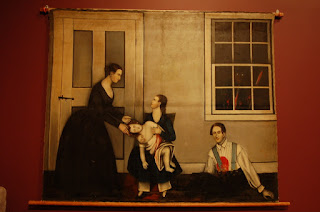A SENSE OF COMMUNITY
“Yes Captain, but your enthusiasm has made you forget your glass tower…”- Rev. Charles Rockwell Sketches of Foreign Travel and Life at Sea 1842
I’ve lived in three cities in my lifetime—Baltimore, San Francisco and New York—and always in the hood.
One hot summer night after working my shift at Max. Fish, I walked home down E7th Street to Ave. C, as the sun was breaking over the East River. A kid was in front of me on his tricked out, ape handle bar, banana seat bike. As he weaved all over the sidewalk, I noticed something fall out of his back pocket. About mid-block I came upon what looked to be an ounce of dope in a plastic bag. I gently put my boot over the bag and shouted at the kid doing wheelies in front of the Laundromat. “YO!” The kid spun his bike and came at me like a freight train.
In those days it was not unusual for anyone (even kids) to be armed in the East Village. I stood my ground, looked him right in the eye and said, “Look under my foot.” As I slipped my boot off the dope, his jaw dropped and his glare faded. He picked up his product, looked at me with teared up eyes, realizing I’d probably just saved him from a world of pain and thanked me profusely. From that day on I couldn’t walk past that Laundromat without a cheerful “Papi!” or just a righteous nod aimed in my direction. Community relations are very important.
Order became more and more difficult to maintain at the simmering, filthy, overcrowded Newgate. The community was disintegrating. Prison officials brought back what many considered tried and true methods of control: flogging, stocks, bread and water, chaining to the floor and something called a Sunday Cell; a room “five foot in height and three and a half feet square,” in which one could neither fully stand nor lay down. William Coffey described the room where, “six men could be situated, snugly handcuffed, without bread or water, for two or three days together, during the heat of the summer, in the brutal caprice of the Principle Keeper.” All these “reforms,” and corporal punishments, were instituted in response to multiple riots, inmate fires, guard (and inmate killings), and an overall break down in anything close to order at Newgate. The death penalty by hanging was also re-instituted in the prison, but nothing seemed to have any effect in quelling the violence.
As Newgate degenerated into an unmanageable abyss, Dewitt Clinton’s construction on a brand new facility in the little upstate town of Auburn, was already nearing completion. A site that had once been a Cayuga Indian village destroyed by General Sullivan and Dewitt’s father James Clinton, alongside an old fur trading route, was chosen for the site of New York’s newest, most modern, State Prison.
Built with local, as well as convict labor, the six acre plot at the mouth of the Owasco river, was perfectly situated for the hydro-power necessary to run the proposed workshops, such an institution now required to remain self-sufficient. Accepted belief held that some of Thomas Eddy’s Quaker reforms worked, and should be continued, while others, like communal cells, tobacco and liquor, were dispensed with entirely. The hope was, that forced inmate labor, silence, and solitary confinement, when managed properly, could actually make the prison safe for both keepers and inmates, and turn a profit.
Replacing Newgate’s multiple occupancy apartment cells, with single occupancy man- cages, stacked in tiers, Auburn’s human “factory,” housed the prisoners separately at night, while in daylight hours they worked together dawn to dusk. Slavery had slipped effortlessly within the institution’s walls. Corporal punishment, and extreme confinement, although publicly denounced, were never stopped at Newgate, or Auburn. These floggings were just hidden from sight; and public scrutiny. Eddy’s initial reform measures—longer and longer stretches of solitary confinement—and congregate labor became the norm, as whippings for the slightest infraction of the rules were now commonplace. Society would have to be protected from these “wilding animals.”

Comments
Post a Comment